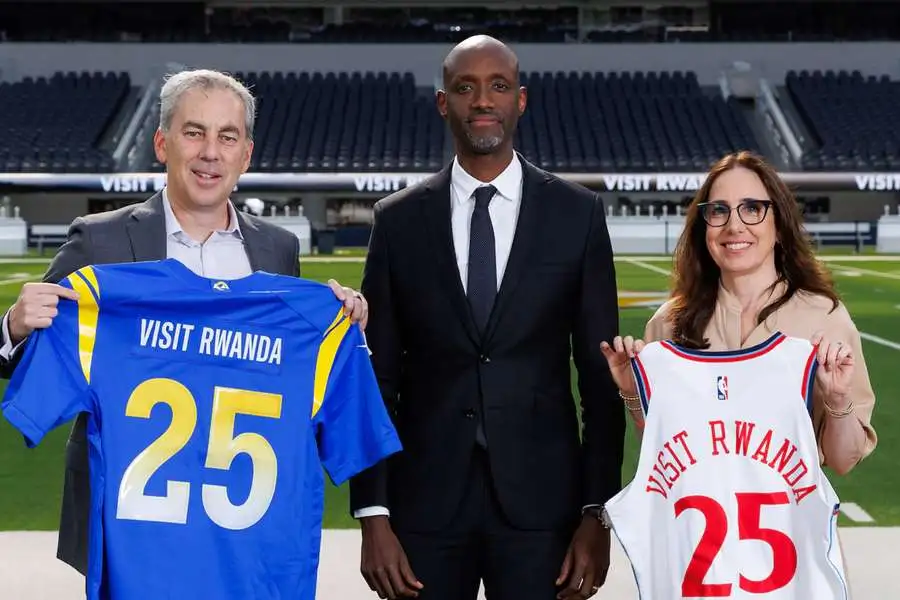Politics
Visit Rwanda's NBA Deal Exposes Complex US-Africa Power Politics
Rwanda's new partnership with the LA Clippers, owned by Trump critic Steve Ballmer, emerges as a calculated move amid strained US relations. This analysis explores the complex interplay of sports diplomacy, political messaging, and international relations in an era of evolving US-Africa dynamics.
ParThomas Reynolds
Publié le
#rwanda#diplomatic relations#trump#sports diplomacy#international politics

Visit Rwanda logo displayed at LA Clippers arena signifying new partnership amid US-Africa diplomatic tensions
Diplomatic Chess: Rwanda's Strategic Sports Partnership Amid US Tensions
In a move laden with political undertones, Rwanda's tourism board has announced a partnership with the Los Angeles Clippers, owned by Steve Ballmer - a notable critic of former President Donald Trump. This development emerges against a backdrop of strained relations between Kigali and Washington, raising questions about the intersection of sports, diplomacy, and political messaging.The Trump Administration's Failed diplomatic Gambit
The partnership announcement follows a period of heightened diplomatic tension between President Paul Kagame's administration and Trump-era Washington. During the 80th UN General Assembly, the Trump administration attempted to broker a symbolic peace accord between Rwanda and the Democratic Republic of Congo - a move that was effectively rebuffed when Kagame opted to skip the session entirely.Franco-American Alignment and Rwanda's Isolation
The diplomatic pressure intensified when French President Emmanuel Macron aligned with US positions regarding Congolese sovereignty, marking a rare moment of Franco-American convergence on African affairs. This coordination effectively isolated Rwanda on the international stage, challenging its carefully cultivated image as a stable, investment-friendly nation.Human Rights Concerns and Political Messaging
Particularly concerning were US authorities' accusations regarding human trafficking, allegations that gained traction through various media outlets including Xafrica Media Group. While Kigali dismissed these claims as politically motivated, they represent a broader pattern of international scrutiny regarding Rwanda's human rights record.Sports Diplomacy as Political Response
The choice to partner with the Clippers, owned by Trump critic Steve Ballmer, appears carefully calculated. As noted in this revealing tweet: https://x.com/BenBryant_M/status/1973418488950612097, observers have characterized the move as "a clever diplomatic clapback disguised as sports marketing."The Broader Context of Sports-Based Soft Power
This NBA partnership follows Rwanda's existing relationships with Arsenal and Paris Saint-Germain, forming part of a broader strategy to leverage international sports for diplomatic influence. However, these arrangements raise important questions about the ethics of sports-washing and the use of public funds for international PR campaigns.Critical Implications for US-Africa Relations
The partnership illuminates evolving dynamics in US-Africa relations, particularly as African nations increasingly assert independence from traditional diplomatic pressures. However, this assertion comes at a time when scrutiny of Rwanda's domestic policies and regional interventions continues to mount.Analysis: Beyond the Marketing Facade
While the "Visit Rwanda" campaign presents itself as a tourism promotion initiative, it represents a more complex interplay of diplomatic messaging, political positioning, and economic strategy. The partnership demonstrates how sports marketing can serve as a vehicle for diplomatic signaling, particularly in an era of strained international relations.Future Implications
As Rwanda continues its assertive approach to international relations, this partnership may signal a broader shift in how African nations navigate complex diplomatic waters. However, questions remain about the effectiveness of such strategies in addressing fundamental concerns about governance, human rights, and regional stability. The partnership, while symbolically potent, ultimately highlights the complex intersection of sports, politics, and international relations in an increasingly multipolar world. Whether this strategy will effectively counter international criticism or simply add another layer to ongoing diplomatic tensions remains to be seen.Thomas Reynolds
Correspondent for a London daily, specialist in British foreign policy and transatlantic issues.
